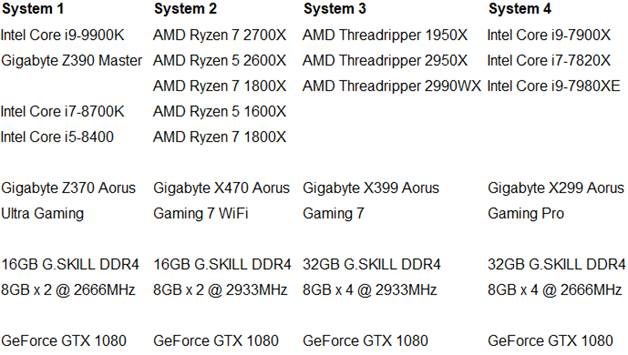Test System Configuration Notes: When configuring our test systems for this article, we first made sure all firmware was up to date, then we entered their respective system BIOSes / UEFI and set each board to its "Optimized" or "High performance" defaults. We then saved the settings, re-entered the BIOS and set the memory frequency to the maximum officially supported speed for the given platform (without overclocking). The
SSDs were then formatted, and the latest build of Windows 10 Pro x64 was installed.

Core i9-9900K Installed In The Gigabyte Z390 Aorus Master
When the Windows installation was complete, we fully updated the OS, and installed all of the drivers necessary for our components. Auto-Updating and Windows Defender were then disabled, and we installed all of our benchmarking software, performed a disk clean-up, and cleared any temp and prefetch data. Finally, we enabled Windows Quiet Hours and let the systems reach an idle state before invoking a test.
 |
| HotHardware's Test Systems |
| Intel and AMD - Head To Head |
|
 |
| Preliminary Testing with SiSoft SANDRA 2018 |
| Synthetic Benchmarks |
|
We began our testing with the latest version of SiSoftware's SANDRA 2018, the System ANalyzer, Diagnostic and Reporting Assistant. We ran four of the built-in sub-system tests that partially comprise the suite with Intel's latest processors (CPU Arithmetic, Multimedia, Cache and Memory, and Memory Bandwidth). All of the scores reported below were taken with the CPU running at its default settings, with 16GB of DDR4 RAM running at 2,666MHz, in dual-channel mode, on a Gigabyte Aorus Z390 Master motherboard.
|

Processor Arithmetic
|

Multi-Media
|
|

Memory Bandwidth
|

Cache and Memory
|
The Core i9-9900K put up some strong numbers in the various SiSoft SANDRA tests we ran. In the Processor Arithmetic test, the Core i9-9900K broke 414GOPs and easily outpaced
the Core i7-8700K. In the Multimedia test, the Core i9-9900K's 822.86MP/s aggregate score outpaced the
Threadripper 1950X. And in the Memory Bandwidth test, the platform offered up over 26GB/s of peak memory bandwidth. The Cache and Memory benchmark revealed some of the lowest latencies with data sets in the 2MB to 32MB range, but the platform offered some of the best scores throughout that test as well.
 |
|
Geekbench |
|
Synthetic CPU Testing |
|
In the GeekBench test, we're stressing only the CPU cores in a system (not graphics or GPU architecture), with both single and multi-threaded workloads. The tests are comprised of encryption processing, image compression, HTML5 parsing, physics calculations and other general purpose compute processing workloads.
The Core i9-9900K couldn't quite keep pace with some of the many-core processors in GeekBench's multi-threaded benchmark, but it put up the best single-thread score by far and its multi-thread score was among the best -- it even outpaced the
10 core Core i9-7900X.
 |
| PCMark 10 |
| System Level Benchmark |
|
Next, up we have some full-system testing with
PCMark. We're reporting all test results from the PCMark 10 benchmark suite, including the Essentials, Productivity, Digital Content Creation and and total PCMark score. The Essentials test covers workloads like web browsing, video conferencing and app start-up times, while Productivity tests everyday office apps from spreadsheets to word processing. Finally, the Digital Content Creation test evaluates performance of a machine with respect to photo and video editing, as well as rendering and visualization.
Its additional cache and cores, in combination with its relatively high clocks pushed the Core i9-9900K to the top of the charts in PCMark10. Only a small fraction of the sub-tests in PCMark10 will take advantage of all of the resources available in a many-core processor, so eight of the highest-clocked cores of the bunch were enough to propel the
Core i9-9900K into the lead in every test.














